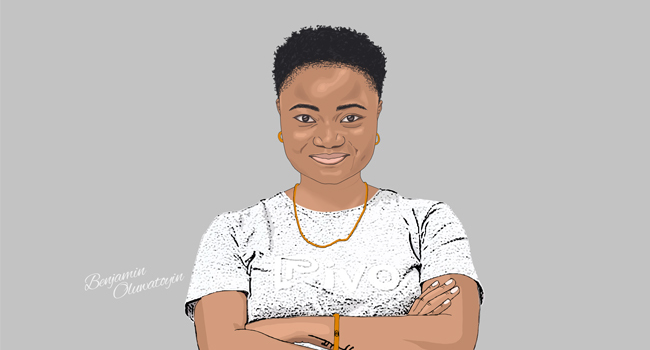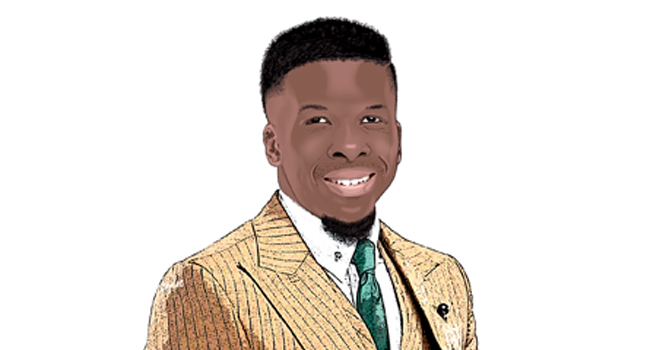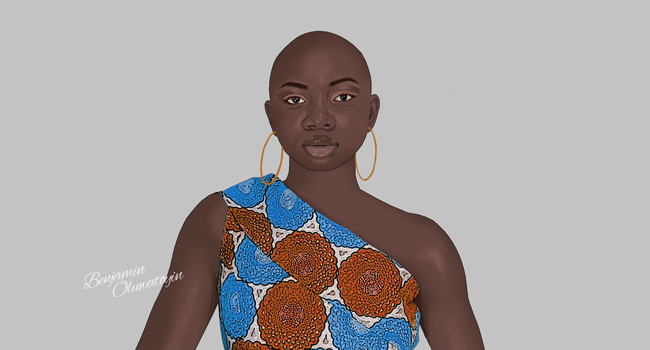
In July, Amadi-Emina’s latest startup was selected as part of Y Combinator’s Summer 2022 batch. It was a watershed moment. In this interview, she talks about how she got into building technology products – including a eureka moment in her Okada dorm room – and the value of staying optimistic.
First Class is a column about extraordinary Nigerians aged 35 years and below. It collects their thoughts on what it takes to thrive as a young person in Nigeria.
Do you know someone who fits the bill? Recommend a name here.
Sign up to receive the latest installment of exclusive First Class interviews in your email.
What was growing up like for you?
I grew up in Lagos. My parents were raised here as well. My dad is Delta-Igbo and my mum is from Cross River. And my mum speaks Yoruba very well. But unfortunately growing up in Lagos, I didn’t master speaking Yoruba. I went to primary school in Lagos. And a bit of my secondary education. I went to St. Saviour’s School in Ikoyi. Then I went to boarding school in Jos. I did that for a bit, then went to Canada for a year.
Why did they send you to Jos?
I think they wanted to develop a level of independence in their kids. And the best way to do that is to send your kid all the way to Jos. And I think it was actually a very interesting experience. Going to school in Jos, I learned independence, how diverse Nigeria really is – because there is a thing about being in Lagos, you think everything is in Lagos. And, of course, boarding school is always a bunch of interesting stories. Then for a year, just after SS1, I went to secondary school in Canada. A private secondary school – which is a bit interesting because people typically do their secondary school here and go to university abroad.
Was that because your family moved to Canada?
It actually really wasn’t because I was enjoying my secondary school life. But I guess that came with some level of exposure. I think one thing my parents were big on was opening us to a lot of different experiences, even while we were young. So I think that’s one of the experiences they wanted to create.
So I came back to do private university in Nigeria. I went to Igbinedion University. So, yes that’s a bit of my background. There were a lot of privileges and exposure that we enjoyed, which I guess influenced my life and how I think about things. I have three siblings. I’m the first girl but I have two older brothers. And I think having older brothers also teaches you some level of toughness because you end up playing wrestling when that’s not what you want to do. So, it was very interesting going up. I come from a super close-knit family. One very important thing I always remember from my childhood – apart from being ‘one of the boys’ – is the fact that my form of play was to always be a businesswoman, going to an office, signing files, firing my dolls, hiring them. So I guess from a young age, I wanted to be some sort of boss.
How did you get into tech and finance?
My dad influenced my tech journey. I wanted to be a medical doctor because my dad was a medical doctor. And in this bid to be a doctor, I wanted to open my own hospital and make it the biggest in Nigeria. And I guess he, being in the field and seeing how that was just a pipe dream especially in a society like Nigeria, advised that if I’m more concerned with building big things, I should read Computer Science and learn how to build software. And this was in 2005 when I was just getting ready to get into university. He told me years from now, tech would rule the world. And then after that, I can build the conglomerate I was aching for.
Now, why finance? While I was in the university – 300 level I think – I came across a company, Dwolla, and they were based in the US. And what they were doing was – this was before mobile money, before Paga – peer-to-peer payments using bank accounts. And I was like, this is so cool. And I wondered why we didn’t have that, where I could just pick up my phone and pay into a person’s account, someone who was in close proximity. And the technology then was Bluetooth, and QR codes. So that was when my foray into the world of tech and finance came into being. I called my solution PayEasy and started it in my dorm. These things happen in the US and Stanford, but nobody knows that in Igbinedion university or Covenant or Babcock, it is also happening.
So everything around finance, financial technology, and the possibilities that exist in that space, hit me at 300-level. Interestingly, before I could roll out the product, Paga came into the picture. And that’s what they say about ideas – when it’s hitting you, it’s also hitting about 10 to 15 other people. Unfortunately, I didn’t have the luxury of time to execute it.
And then I had the opportunity to intern at financial institutions. I worked at Access Bank for a bit. I interned at Verod Capital as well, which is a huge capital management agency.
Did you have any challenges at the beginning?
There were a bit of barriers. The first was primarily the fact that this whole tech ecosystem in as early as 2010 when I had just graduated did not exist. Nobody was building technology products, nobody cared about tech. The only sort of idea of tech that existed then was Interswitch and Chams. So there was really no one else, especially at such an infancy level. So that guidance didn’t exist. And of course what typically happens is, you find something else to do. And that’s what I did. I decided to work for a software company in Abuja and I also decided to build my own technology consulting company. So I was building software for governments.
You then co-founded a company called Jalo?
Yes. I was going for a meeting and then I forgot some items in the house. And I was trying to figure out who could help me bring the item. I didn’t have a driver. So I was looking for a courier service. None of them existed back then. It’s now we are seeing an influx of technology-enabled logistics solutions. None of that existed in 2016. And I thought it was an opportunity. I just started building. I built the app to solve my problem of having someone pick up anything I want at the touch of a button. So that was Jalo. We raised some money. Jalo was part of the first cohort of Ventures Platform, the first startup incubator and accelerator in Abuja. They gave us capital, about $10,000. We also got a grant from the Tony Elumelu Foundation. And yes, we were deliberate partners for Jumia food and commerce, Konga; we were in Abuja and Lagos; we were doing inter-state delivery at the touch of a button. So, it was pretty exciting and that was my very first company. Then I sold Jalo to Kobo360.
Why did you decide to sell?
It was a case of do you compete or do you collaborate? We were ready to start doing the Kobo360 model where you are using assets like trucks and vans. And I think I really wanted to collaborate because I felt there was a lot of learning I still had to do. I moved on to work at Kobo for some time before entering my next startup adventure, which is Pivo.
Tell me about Pivo?
I’ll start from what the problem was. While I was working at Kobo, I was head of port operations. There was a common thing that I found, whether from the side of our transport partners or even from Kobo’s side. And that was just a lack of access to quick liquidity. If you give a transporter a job to carry containers from APM to Kano, if you can’t give them that advance payment, they often times find it difficult to get liquidity to fulfill the order. From a Kobo 360 perspective, if your end customer like Flour Mills of Nigeria is still holding your invoices and hasn’t paid you, you don’t even have the liquidity to advance your transporters. So, it was that issue I saw and wanted to solve. And it was in solving that issue we uncovered so many other challenges that these businesses have, and also other opportunities that exist. So, at Pivo, what we are is a neo-bank – that’s the umbrella term – because what we are doing is providing access to financial services without the burden of physical locations. Now, we like to say as a digital bank, what we are primarily trying to solve is: for SME vendors in the supply chain, we want to provide the financial services that can help them pay and get paid faster. So what does that mean? We are providing access to capital. If I know that my invoices are going to be delayed for 30 days, but I need capital now, I can come to Pivo to provide that capital. That’s one side. The second thing we are looking at is to provide SMEs the tools that can help them pay; whether it is a debit card, a bank account; so that you can transfer money and pay your vendors.
Now, when you talk about financial services that lets these guys get paid, this is what we mean: we are not just providing them an account, but we are providing them a smart account. With your Pivo account you can send electronic invoices. Right now, everything around getting paid for these vendors is very manual and cash-based. They have to courier paper invoices to Lafarge, for example. So we are eliminating all of that manual process that is tied to getting paid. You can send electronic invoices, send payment links. You can track the status, see when the payment is overdue, send a nudge to your end customer, or even know when your invoice has been opened.
The long term goal for Pivo is to really build the financial operating system for supply chains. Right now we are starting with the SME vendors, providing the basics of what they need to transact. As we scale and grow, we then want to meet the owner of the supply chain and provide the system that controls how money flows from the top to these SME vendors.
I was going to ask whether Pivo plans to scale beyond the supply chain sector?
For us, the supply chain sector is just enough. A supply chain exists anywhere around the world. And the actors are the same. You have the owner, the SME vendors – a supplier, a logistics service provider or a wholesale distributor of the finished goods. So that’s really what we want to focus on. We are heavily focused on the manufacturing supply chain, because there is pharmaceutical supply chain, construction, telecoms and the likes. But we are specifically focusing on manufacturing and zeroing in on building the financial services platform for them.
What have been your major challenges building this business?
Our major challenge is essentially two things. One is finding the right team that understands our vision and mission and purpose, that also fits into the team culture. Because to be honest, the success of your business is primarily dependent on your team. Finding the right team has been a challenge. The second thing is being at par with the level of scale and growth that we are seeing. If your company is moving faster than you, it’s a problem. Scale and growth is a good thing, so I guess it’s a good problem to have.
You recently got into Y Combinator. How big of a win is that?
It’s actually a very big win. Interestingly, while I was building Jalo, I applied to Y Combinator twice. We got as far as an interview. And back then they did the interviews all the way in San Francisco. So imagine travelling to San Francisco twice just to be told ‘no’. But with Pivo, it’s a really huge win. Not even from just personal experience, but also from the level of validation that comes with that. It’s a huge win.
What are some of the mistakes you’ve made in your career?
I’m not sure I’ve made mistakes. Everything seems to have aligned the way they were supposed to. Everything came with very valuable experiences. Even from when I built my first IT consultancy at 23; of course it didn’t really achieve any significant growth or milestone, but I learnt a lot, how to hire, how to interview, how to do financial modelling, how to write proposals, how to speak to clients, because you are entering government offices to have conversations. So, nothing really I would have done differently. Some people would say why didn’t I get a job after NYSC, but there was value from actually going to start a business first. There was learning tenacity, because there were times when you were broke, you learn to shoulder on and push through the struggle.
For someone just starting out, what would be your advice?
I would definitely say don’t be afraid to learn, to make mistakes. Don’t be afraid to adjust to the wind of your sails as you grow. And if you want to get from point A to point B, there are different routes to get to point B. So don’t be afraid to tread whatever road life takes you on. Just keep your eyes focused on point B.
Do you ever think of leaving Nigeria permanently?
I spend a lot of time here and also abroad – I try to take holidays when I can. The funny thing is I have not been able to see myself leaving Nigeria.
I saw this video tweet of a crab being cooked in a broth and corn. And the crab, while boiling to death, was still eating out of the corn. So, maybe it’s a case of being so used to the madness that I don’t realise that there’s actually better out there I should explore. But I really don’t think that’s the case. I’ve never seen myself leaving Nigeria. I think last last if the wahala gets too much, you can always escape and come back, if they don’t lock the borders. But I don’t see myself leaving permanently.
Are you a strong believer in the Nigerian project?
I’m not a believer in the Nigerian project. But I’m a believer in some of the Nigerian people. And I think that belief provides some sort of hint that things could be better. I was listening to Chimamanda the other day and she said she’s a pessimistic optimistic and I think that might be a way to describe me as well. You hold on to hope, but then you know things are really bad. So, I think I hold on to a level of belief in the Nigerian people. And finally, it will be these people that lift us out of the mess we are in.
Are you interested in politics?
My interest in politics stops at the fact that I’m a consultant for INEC. And so, you just understand the political processes and how dynamic it is. But wanting to hold any political office? No. Wanting to support a candidate I personally believe in? Yes. Would I go as far as standing in the rain holding banners? No. Would I go and vote? Yes.
So you are registered to vote in 2023?
Yes. I’ve been registered to vote since 2011. But this would be the first time I actually go out and vote.
How do you think young Nigerians can make Nigeria a better country?
One of the ways we can make Nigeria a better country is to, within our own sphere of influence just commit to doing better. And that can look like something as simple, as don’t litter on the road, don’t try to form four lanes on a two-lane road in traffic. So I think individually it should just be a personal commitment to do better. And I think that’s where change usually starts from.
First Class is a column about extraordinary Nigerians aged 35 years and below. It collects their thoughts on what it takes to thrive as a young person in Nigeria.
Do you know someone who fits the bill? Recommend a name here.
Sign up to receive the latest installment of exclusive First Class interviews in your email.




